How do I get my child into school? A guide to getting children with autism or developmental differences the school support they need
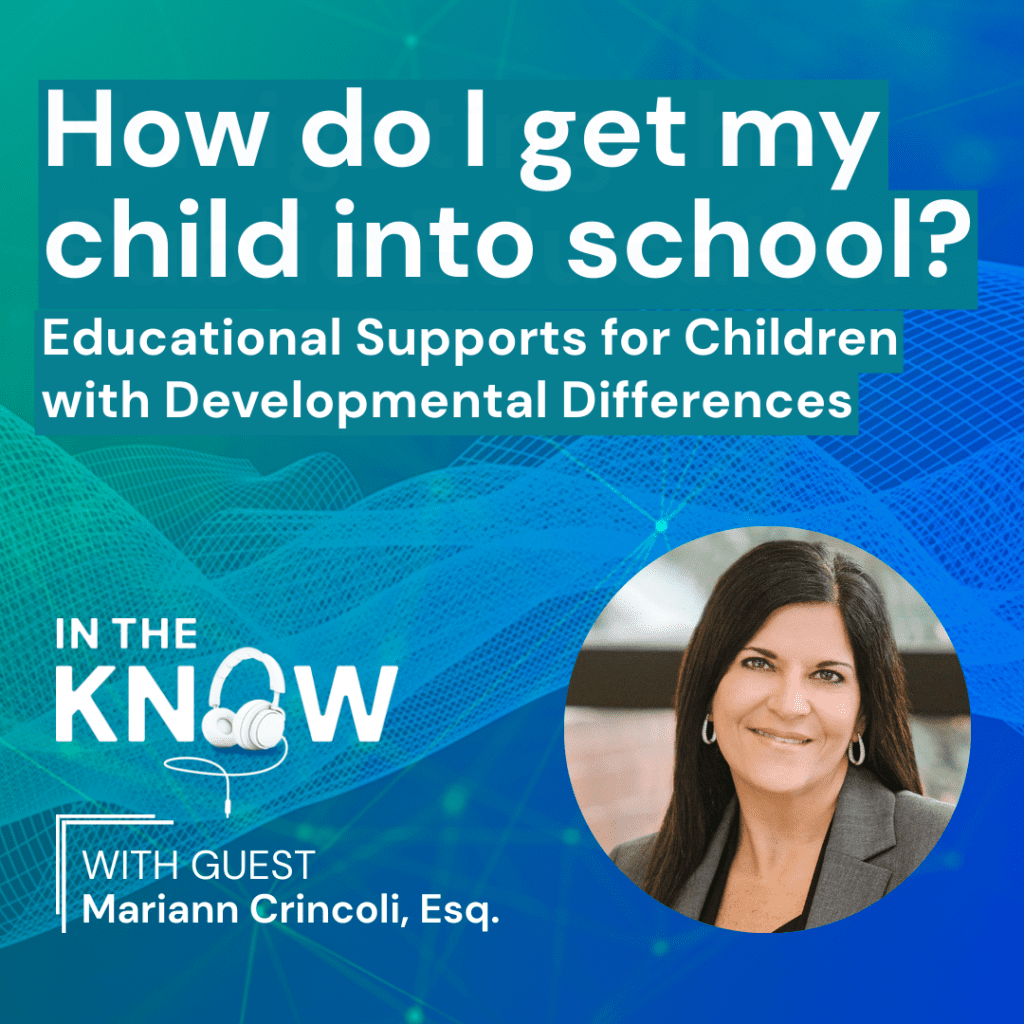
As the parent of a child with autism or other developmental differences, the process of getting their child into the school system can be confusing and challenging. For many families, the biggest question about getting their young child into school is, where do we even start? In the latest episode of the “In the Know” podcast, Mariann Crincoli, Esq, attorney who specializes in special education, talks in detail about the entire process of working with the local public school system to make sure every child receives the educational support they need and deserve. One bit of advice that Ms. Crincoli offers to families is to act early, by getting in contact with the local school district (or with the local early intervention program for preschool children) as soon as one’s child begins to show signs of developmental differences that are likely to impact their education in any way. “When a parent suspects a child has a learning difference or a disability, it usually is incumbent upon them to share it with the school district if it is impacting the child educationally,” she says. “And education is a broad concept. It doesn’t just include academics. It includes whatever skill a child requires in order to be a functioning member of the school community and beyond. It could be behavioral, it could be academic, it could be social, it could be emotional, it could be toileting skills. It really is whatever skills a child requires.” Ms. Crincoli also spells out, step by step, what happens after the family makes first contact with the child study team at the local school district. This wide-ranging conversation includes the typical timing of how soon evaluations and planning meetings happen, the three criteria that a child must meet to be eligible for special education under the law called IDEA (the Individuals with Disabilities in Education Act), and what rights and supports a family is entitled to within the public school system. For parents facing the prospect of a child going to school soon, or whose child is already in school but needs additional support, this podcast is a useful how-to guide for talking with the school district, reviewing and agreeing on an IEP (individualized education plan) for your child, and working with the school district to set and monitor educational goals over time. This podcast can also be useful to clinicians, as it discusses the ways that pediatricians, child psychologists and psychiatrists, and others involved in the child’s care can help inform and help guide this process. Ms. Crincoli brings to this conversation her 30 years of legal experience, including more than 20 years working on educational law matters. She is a partner at the law firm Sussan, Greenwald, and Wesler, whose goal she describes as to “advocate for those children to obtain appropriate supports and services from their local public school districts so that they can appropriately access their education and make meaningful educational progress,” which is a goal that every family has a right to, whether or not they decide to work with an attorney. Ms. Crincoli also talks about the role that legal counsel can serve in helping the child receive the educational services and supports they need. In many cases, parents and educators are in agreement about the types of supports that the child requires, and the educational goals that they hope the child will achieve. In those cases, Ms. Crincoli says, an attorney “is not required. There’s no law that mandates that parents retain law firms to assist them.” However, in cases in which the parents and the school district do not agree on the necessary supports, or when parents have the resources to get additional help navigating the system, legal help may be needed to help reach agreement between all parties involved. Overall, working with a school district can be a cooperative and productive relationship, although it does require effort on the part of the parents. As Ms. Crincoli advises, “My advice is to educate yourself, familiarize yourself with the special education process. Be transparent about the needs of your child and what you are seeing at home. Communicate, memorialize your conversations with school district staff in writing. If your child is struggling with homework, don’t immediately run to get tutors. Talk to the teacher and talk to the administrators if you really think your child is struggling educationally.” One of the most important elements is communication, and to always talk with the school about what is going on with your child, and remember that every child is entitled to an appropriate education. It is every family’s right to get their child the education and supports that they deserve. Episode Outline: 00:00 Introduction and Overview of Special Education Law 03:25 When to Share Concerns with the School District 07:05 Understanding the Three-Pronged Test for Eligibility 16:09 Advice for Parents and Clinicians in Navigating the Process 23:40 Monitoring Progress and Reevaluating IEPs 31:39 The Role of Clinicians in Advocating for Children 35:00 School Districts’ Obligation to Identify and Evaluate Children For more of this insight-filled conversation, listen on the player above, or find “In the Know, Presented by Cognoa” on your favorite podcast platform, such as Apple Podcasts, Spotify, Podbean, and others. In the Know regularly features conversations with top experts in behavioral and developmental health to provide information and insights for clinicians and for families of children with developmental differences. Be sure to subscribe so you can be sure to catch the future episodes when they are available!
What Applied Behavioral Analysis (ABA) can – and should – look like from a parent’s perspective
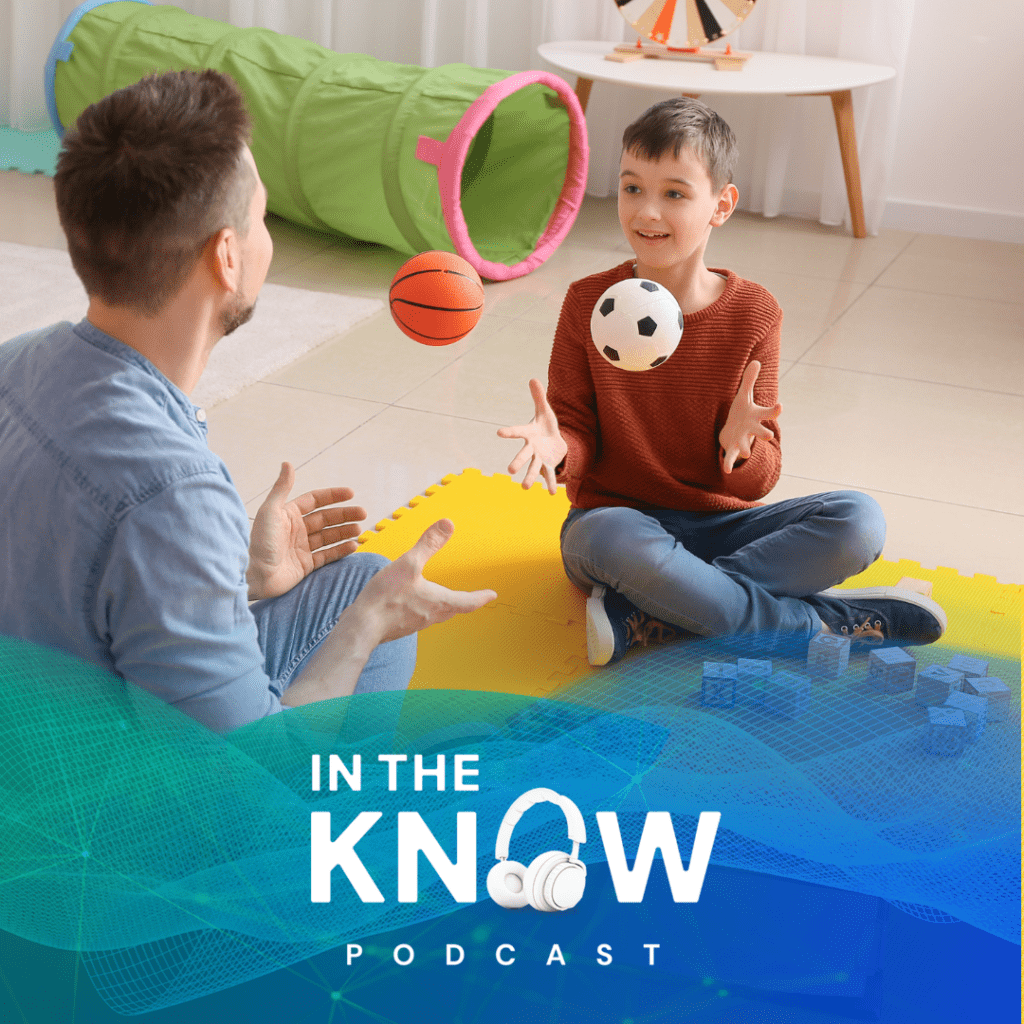
Matthew Woodard, M.Ed., BCBA, LBA, and CEO & founder of BASICS NW is in a unique position to talk about today’s approach to Applied Behavioral Analysis (ABA). He has been practicing ABA for over 15 years, and in the last year became a parent of a child with autism. In the latest episode of In the Know, Woodard has a candid conversation with child and adolescent psychiatrist Dr. Jennifer Shannon M.D. about how being a parent has changed his thinking about ABA, and what parents should expect from ABA. ABA is an intervention designed to help children with developmental or behavioral challenges develop skills they need for regulating their emotions and interacting with others, while lessening their problematic behavior, such as self-harm. In light of recent scrutiny of the methods and outcomes of ABA in the child behavioral and developmental health community, Dr Shannon asks Woodard, “From the parent perspective, what does good ABA look like?” “So now I have another angle I can position myself in, as a parent and provider coming in, right?” Woodard says. “And from this perspective, I think good ABA means that the practitioner asks a LOT of questions and is really trying to get to know your child and your family. The one thing we know is that every situation is unique. Every person, every family, whatever their sets of contingencies, whatever their values are, whatever their goals are.” He goes on to talk about how his view has changed, now that he’s a parent: “Sometimes when we’re early in an ABA career, it’s like, great, we have something so black and white that we can just do, and it’s going to be effective. And that might be true. But as a parent, if an ABA provider was just coming in saying, hey, here’s what we need to do, we’re gonna do this, this and this, I would have some concerns about that. I would want them to be asking a lot of questions and I would have a lot of questions for them too, and to have that communication back and forth. Because I know now that it’s not black and white like maybe those first few years. I thought it was going to be nice and clean and tidy and then I realized, no it isn’t.” In this episode, Woodard also talks with Dr. Shannon about what parents can and should expect from their first couple of visits with an ABA provider. Woodard describes his experiences working with different types of families, some of whom have very specific goals and high hopes for ABA, and some who have never heard of ABA before, but were recommended by their doctor. In all of those cases, Woodard emphasizes the importance of honest upfront conversation, and continually keeping the lines of communication open between the parents and the practitioner, so the approach is individualized to the needs of that child. In the end, Woodard explains that for ABA to be effective, it has to be able to match up with the goals of the family, and to be able to move at a pace and intensity that is right for them. As he says, “You know, when I was younger, I think I was in a hurry to try to help people to feel better and things like that. And again, now it’s no, there’s a journey here. And how do we help?” LIsten to the entire episode to hear more of this conversation about what parents should know about ABA, what questions they should be asking, and what they should expect from ABA therapy. Our new podcast series, In the Know, regularly features conversations with top experts in behavioral and developmental health to provide information and insights for clinicians and for families of children with developmental delays. “In the Know, Presented by Cognoa” can be found on most major podcast platforms, including Apple Podcasts, Spotify, Podbean, and others. Be sure to subscribe so you can catch the future episodes when they are available!
“The Healing Side of ABA”: How Applied Behavioral Analysis (ABA) therapy found its kinder, gentler side
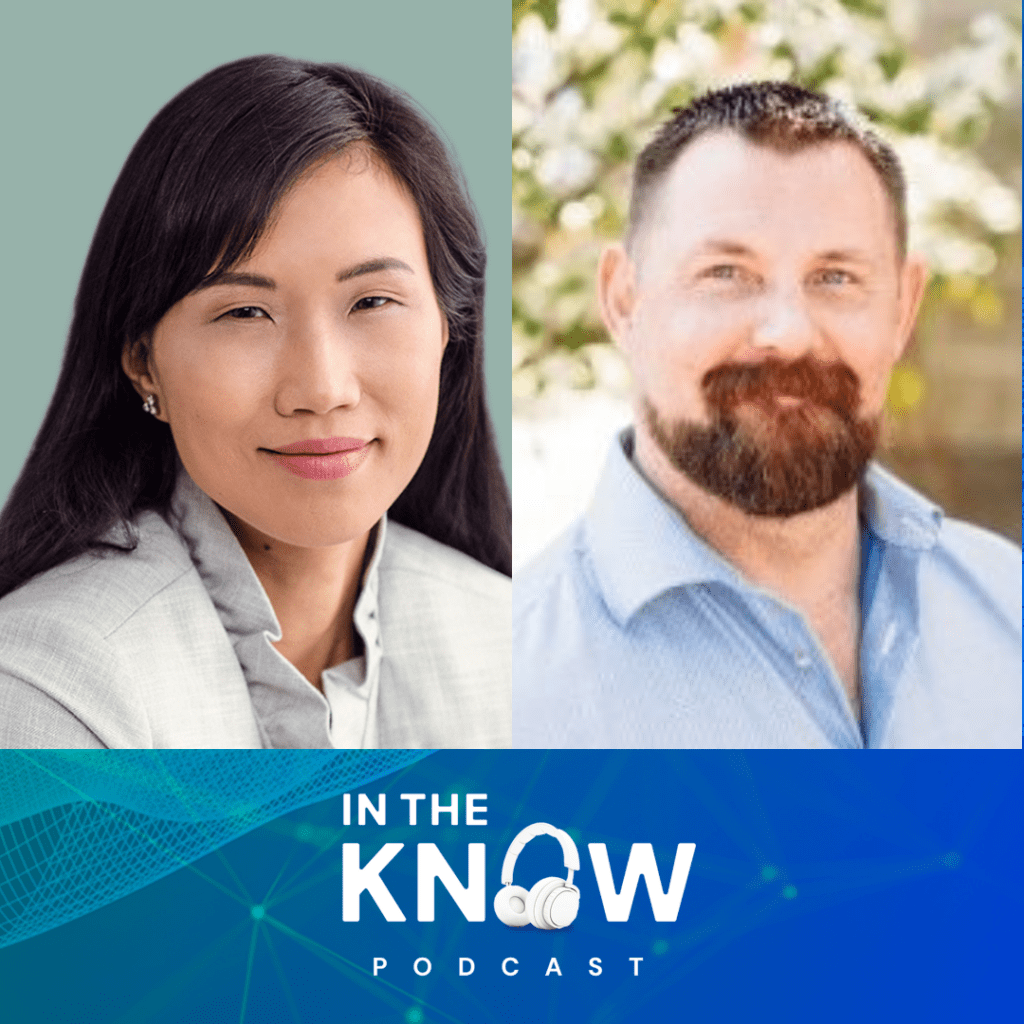
Applied Behavioral Analysis (ABA) is a therapy that people have strong feelings about. Parents making decisions about their child’s therapy may have heard very different things about ABA, ranging from how it has helped children with autism gain independence and self-management skills, to how some people with autism–who are now adults–regret or are even traumatized by their past experiences with ABA as children. Getting such differences of opinion can make decisions about interventions difficult for families who are already reeling from the realization that their child has a developmental difference, navigating the “labyrinth” of decisions about interventions, education, insurance, and other concerns that immediately follow an autism diagnosis. In the latest episode of “In the Know,” child and adolescent psychiatrist Dr. Jennifer Shannon has a straightforward and open conversation about what ABA looks like today with Matthew Woodard, who is a BCBA (board-certified behavior analyst) and founder of Basics NW, an active ABA practice in Washington state. Woodard is also the parent of a young child with autism. Through this conversation, these two colleagues and experts talk frankly about what did not work well in the earlier years of ABA practice, what has changed over the last decades, and how the current practices of ABA are geared more toward building strengths and finding possibilities for children with autism and other developmental and behavioral differences. What is ABA? ABA is an intervention designed to help children with developmental or behavioral challenges develop skills they need for regulating their emotions and interacting with others, while lessening their problematic behavior, such as self-harm. ABA therapy traditionally involves much repeated behavior, and when the child achieves a positive goal, they are rewarded, while negative behaviors face a negative consequence. This pattern reinforces the desired skills and discourages the unwanted behaviors. While ABA has been shown to be effective in studies, some families and people with autism are still critical of the practice. In its earliest form, ABA included punishments along with rewards, although current practitioners are quick to point out that punishments are no longer part of the program. Some critics also argue that the constant repetition is hard on the kids who are treated, as well as trying to make children conform to “neurotypical” behavior, instead of encouraging society to be more willing to adapt to the needs of people who are neurodiverse. “New” ABA vs “Old” ABA Woodard says that his conversations with families who come to him inquiring about ABA therapy often start with handling objections. “What I most commonly get at this point is questions about something they’ve read on a website, heard from a friend or someone else, or on social media…And the reality is that there have been things that are part of our field that are things we wouldn’t be doing these days. So I think it’s important that they’re asking these questions and they are getting that information.” Woodard describes some of the differences between “old” ABA and “new” ABA, including frequent monitoring, accepting and adjusting to patient and family feedback, and focusing on the difference between “reinforcement”–which is part of the core principles of ABA–and what would be regarded as “punishment,” which is not a necessary or desirable component of ABA. One of the other misconceptions that Woodard addresses is that the underlying principles are unique to ABA, rather than just being practices that many people use in everyday life. “I think what I really discovered is that it was so similar to coaching because that’s really what it is.” Woodard says. “Every day we’re trying to get better at a skill. Every time we’re trying to do better than we were the day before. It’s a constant process, it’s effort, and it’s persistence” Woodard gives one example of changing our driving habits to adapt to different situations: “ So, you know when you are driving really slowly because you see a police officer on the side of the road, and then when you’re past them, you go faster? That’s behavioral contrasting! Just one example of how we use these principles to respond to things every day.” Woodard also wants to remind listeners that ABA is based on a specific set of principles that have remained unchanged since its founding, and that while some practitioners have not used those principles as well as others, that many current ABA therapists are using those core ideas to build a foundation for success for their patients. The most important part of contemporary ABA practice, which Woodard says is influenced not just by his professional training but by his experience as a dad, is making sure that it is designed to meet the individual needs of each family. “In the past, I used to say ‘I’ve never been a parent, so I don’t know what it’s like 24/7,’” Woodard says. “Now that I am a parent, I see it’s a very different thing–because life is 24/7, not in this little box of 2 hours in a clinic or 8 hours in a school. That’s not life for a family. There’s so much more to it than that. It’s about how we allow them to be the best family that they can be and have the most healthy outcomes long term.” LIsten to the entire episode to hear more of this insightful–and eye-opening–conversation about how ABA has changed and what the current best practices look like. Our new podcast series, In the Know, regularly features conversations with top experts in behavioral and developmental health to provide information and insights for clinicians and for families of children with developmental delays. “In the Know, Presented by Cognoa” can be found on most major podcast platforms, including Apple Podcasts, Spotify, Podbean, and others. Be sure to subscribe so you can catch the future episodes when they are available!
Insights from a Pediatrician who is also a Mom: Early Intervention Can Lead to Better Outcomes
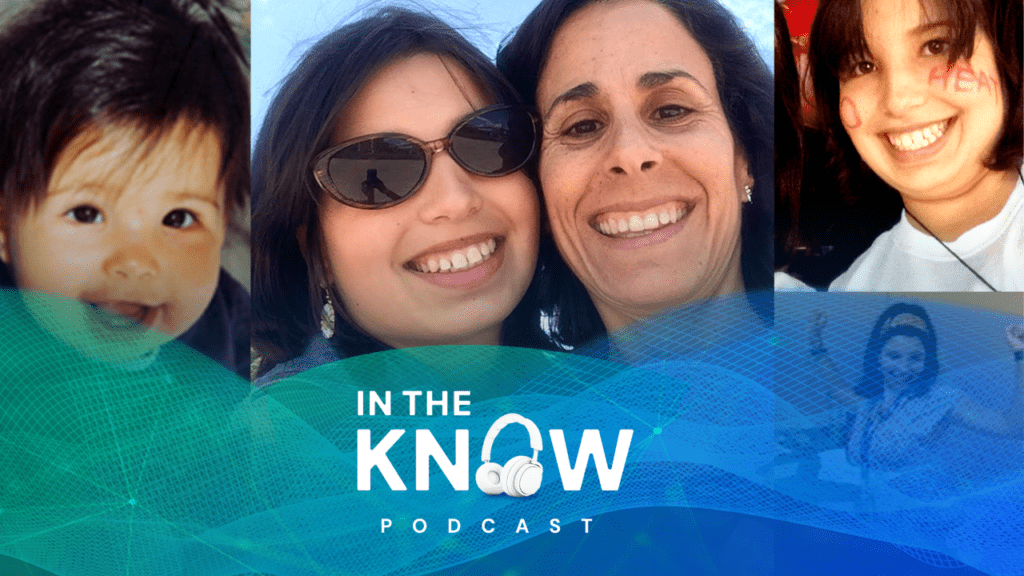
When it comes to child developmental concerns, we are always emphasizing that “early is everything,”: early identification of concern, early assessment and diagnosis, and early intervention can all add up to life-changing improvements for children with behavioral and developmental delays. In the most recent episode of our podcast, “In the Know,” Dr. Judith Aronson-Ramos, a board-certified pediatrician developmental and behavioral pediatrician, talks with us about how she has seen the “early is everything” principle demonstrated both in her 30 years of real-world practice, as well as in her experience as the mother of a child with autism. “I have seen the progress a child can make and the effectiveness and importance of an early diagnosis,” Dr. Aronson-Ramos says. “Before my daughter was diagnosed, some of my colleagues said, she’s fine, don’t worry. But I kept advocating for her, and it was indeed autism. So we started interventions right away and she’s done quite well. She has a graduate degree, she’s married, she drives a car, she’s independent, et cetera. I credit a lot of that to early intervention.” Dr. Aronson-Ramos also talks about how essential it is that with the current shortage of specialists, long waitlists, and other complexities of the medical system, that general pediatricians and family practice doctors are able to identify the signs of developmental concern. With the right training and resources, diagnosis of behavioral and developmental delays don’t just have to be in the domain of the specialist any longer—and a shorter wait for a diagnosis means a shorter wait to appropriate intervention. “It is more and more a part of the training now for pediatricians to know what the signs and characteristics are,” Dr. Aronson-Ramos says. “And many of them are great at it. I’ve worked with many general pediatricians whose instincts are spot on. They used to always have to refer a case because the standard of care at that time was for a specialist to diagnose. But now that the needle is shifting and generalists are more empowered, there are many pediatricians out there who will be able to render diagnosis.” In fact, this aligns with the recent mission statement from the American Academy of Pediatricians, to put more of the diagnostic capability into the hands of pediatricians and family doctors. Listen to the full episode below to hear more insights from Dr. Aronson-Ramos, including information on where to gain more training in assessing and diagnosing developmental concerns. Our new podcast series, In the Know, regularly features conversations with top experts in behavioral and developmental health to provide information and insights for clinicians and for families of children with developmental delays. “In the Know, Presented by Cognoa” can be found on most major podcast platforms, including Apple Podcasts, Spotify, Podbean, and others. Be sure to subscribe so you can be sure to catch the future episodes when they are available!
Jenn Hugunin shares her journey as a mom navigating the system

Our very own Cognoan, Jenn Hugunin, shares her journey as a mom navigating the system, from initial developmental concerns about her child to diagnosis and next steps, with all the ups and downs along the way. Jenn’s experience mirrors that of most families: long waitlists, unclear direction, and inadequate clinical help are all unfortunately part the status quo. But it doesn’t have to be this way. Jenn explains how Canvas Dx can change the narrative. I wish I had Canvas Dx: a mom's journey from initial concern to autism diagnosis for her son from Cognoa, Inc. on Vimeo. #AutismAwareness #AutismJourney #CanvasDx #Cognoa #EarlyIntervention #Earlyiseverything #parentsofautism
Don’t Just “Wait and See”: Pediatricians and Family Practices Are More Important than Ever in Diagnosing Developmental Concerns
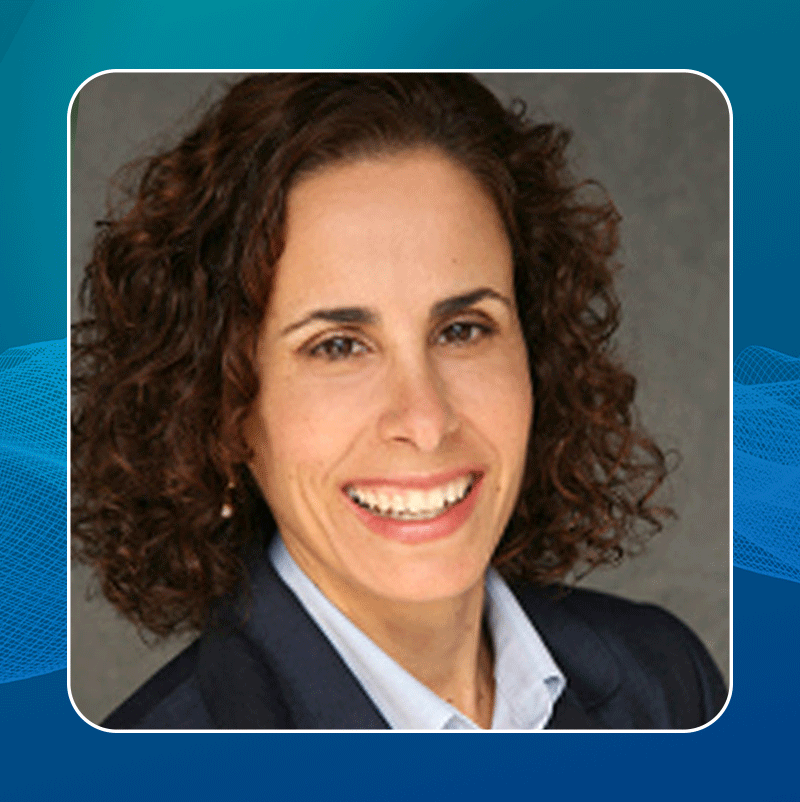
As a clinician, have you wondered how you can be a more integral part of identifying, diagnosing, and supporting developmental concerns in children in your practice? In the most recent episode of our podcast, “In the Know,” we talk about the essential role of the pediatrician and general practice clinician with Dr. Judith Aronson-Ramos, a board-certified pediatrician developmental and behavioral pediatrician who has been dedicated to this specialty for the last 3 decades. Throughout this candid discussion, Dr. Aronson-Ramos emphasizes the importance of early diagnosis in children with developmental and behavioral concerns. She stresses how acting early provides children with effective interventions as soon as possible, but that a shortage of specialists and long wait lists have caused significant delays to assessment, diagnosis, and intervention for many children. General pediatricians and family practice doctors, who Dr. Aronson-Ramos describes as being “in the trenches” with these children and their families, are often among the first to suspect a developmental concern. There is now a growing movement in the health care community, including a recent mission statement from the American Academy of Pediatricians, to empower these front line workers to play a larger role in evaluating children for autism. As Dr. Aronson-Ramos explains: “with the right tools, the right training, the right techniques, and the right reimbursement, pediatricians and family practices can help the waitlist crisis and help their families in situations where they’re comfortable making a diagnosis.” She acknowledges that pediatricians already have a “tough job as gatekeepers,” but highlights how additional training, telemedicine, and the recent introduction of AI diagnostics can “help ease the burden of assessment, as well as determining the developmental domains where the child has a need.” Dr. Aronson-Ramos also shares about her personal experience which inspires her work, as a parent of a child with autism (who is now a thriving, successful adult): “Having gone through that experience and also seeing the amount of progress a child can make and the effectiveness and importance of an early diagnosis, certainly it’s given me a lot of passion to be an advocate for early intervention and certainly to push the influence of developmental behavioral pediatrics in the general pediatric space.” Listen to the full episode below to hear more insights from Dr. Aronson-Ramos, including information on where to gain more training in assessing and diagnosing developmental concerns. Dr Aronson-Ramos is the lead Clinical Assessor at Autism Path 2 Care (AP2C), a medical practice with locations nationwide, which is devoted to advancing the early diagnosis of developmental concern. A2PC’s combined use of clinical expertise and Canvas Dx technology enables them to provide assessments without significant wait times. In addition, their Telemedicine platform is easy to use and reduces the burden on families of traveling, stress on the child of being in a new environment, and scheduling difficulties. Find out more about Autism Path 2 Care and their services at https://autismp2c.com. Our new podcast series, In the Know, regularly features conversations with top experts in behavioral and developmental health to provide information and insights for clinicians and for families of children with developmental delays. “In the Know, Presented by Cognoa” can be found on most major podcast platforms, including Apple Podcasts, Spotify, Podbean, and others. Be sure to subscribe so you can be sure to catch the future episodes when they are available!
Can becoming a Secret Agent help a child find their true self?

Talking about strengths-based interventions with Renae Beaumont, PhD For children with autism and other developmental differences, evidence-based interventions can make life-changing improvements—and the earlier these interventions are started, the better. And as expert clinicians are discovering, basing those interventions on the child’s interests and strengths can be quite effective. In Episode 2 of our podcast series, “In the Know,” Renae Beaumont, PhD, Clinical Psychologist at Weill-Cornell and founder of the Secret Agent Society, talks with us about the impact of early intervention and some of the concepts around which those interventions are built. “The sorts of evidence-based interventions that I’m delivering for kids are based on a couple of different theoretical frameworks,” Dr. Beaumont explains. “Part of what I do is help kids to be more self-aware of the thoughts going on in their head and how they impact on how they’re feeling and what they’re doing.” There are several types of interventions available for kids with developmental delays, such as autism. These programs not only teach skills that support kids themselves, but also help kids communicate their needs and help parents, teachers, and friends understand the child a little bit better. One program that we were eager to ask Dr. Beaumont about was the one that she founded, called the Secret Agent Society, which has been helping kids for over a decade. As their website describes the program, “Espionage-themed resources provide an evidence-based, comprehensive and captivating solution to structured social and emotional learning for children aged 8-12 years old.” “The Secret Agent Society was originally developed for children with autism, “ Dr. Beaumont tells us. “Now it’s been shown to be effective for autistic children, children with ADHD, anxiety disorders, and even neurotypical children who are struggling a bit with friendships or managing emotions. It’s a program that teaches kids skills to feel happier, calmer, and braver, and how to make and keep friends.” As Dr. Beaumont reminded us, caring for kids with autism is often just as much about teaching others around the child the “language” of autism, as it is teaching the child the “language” of the neurotypical world. In that spirit, it is encouraging to know that many autism programs are based around finding and developing the child’s strengths and interests as they are, not trying to change the child into someone they are not. To hear more of this conversation and others in the In the Know series, use the player below or find us on Apple, Podbean, Spotify, and other podcast platforms. Our recently launched podcast series, In the Know, regularly features conversations with top experts in behavioral and developmental health to provide information and insights for clinicians and for families of children with developmental delays. Be sure to subscribe so you can be sure to catch the future episodes when they are available!
Focusing on Child Strengths in Autism – with Renae Beaumont, PhD
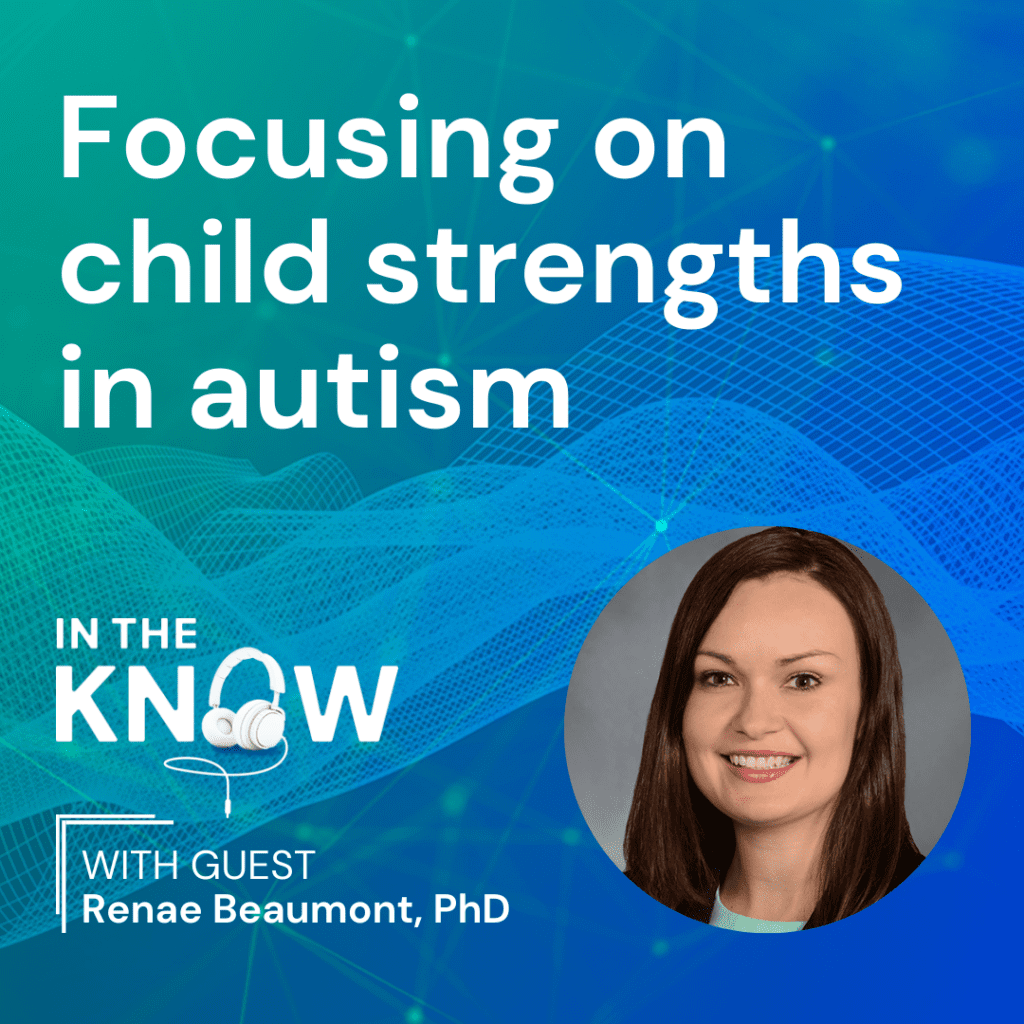
When a child first gets an autism diagnosis, many parents and families immediately start thinking about deficits—that is, what the child can’t do—and how to accommodate for them. In the latest episode of the “In the Know” podcast, Renae Beaumont, PhD, Clinical Psychologist at Weill-Cornell and founder of the innovative therapeutic program Secret Agent Society, describes how focusing on a child’s strengths from an early age, rather than their deficits, can be transformative in helping them become happier, more self-aware, and more skilled in communicating their needs. “Early is everything. Those early years are so critical, and you want to make the most of those,” Dr. Beaumont says. “Helping your child learn skills and knowing the supports that are available will really help them thrive.” In this conversation, Dr. Beaumont also focuses on how families can navigate the waitlists that increase the time to diagnosis, the work that she does not only with families but also with schools and educators to create a more helpful environment for children with autism, and a few of the evidence-based interventions that are currently available. As Dr. Beaumont says, “Thinking in more helpful ways can really help children and even adults feel much better and then take actions and behaviors that are going to lead to better outcomes aligned with what matters to them.” As part of her overall advocacy for children and adults with autism, Dr. Beaumont sees many positives in the directness, creativity, and other unique characteristics that autistic people often share. As she explains, “I think it’s important we understand some of autistic cultural norms just as much as we expect autistic people to understand some of the norms for what we call neurotypical or non-autistic individuals.” Our recently launched podcast series, In the Know, regularly features conversations with top experts in behavioral and developmental health to provide information and insights for clinicians and for families of children with developmental delays. “In the Know, Presented by Cognoa” can be found on most major podcast platforms, including Apple Podcasts, Spotify, Podbean, and others. Be sure to subscribe so you can be sure to catch the future episodes when they are available!
Relying on the “Medical Home”: Expert guidance on connecting children with essential services after an autism diagnosis
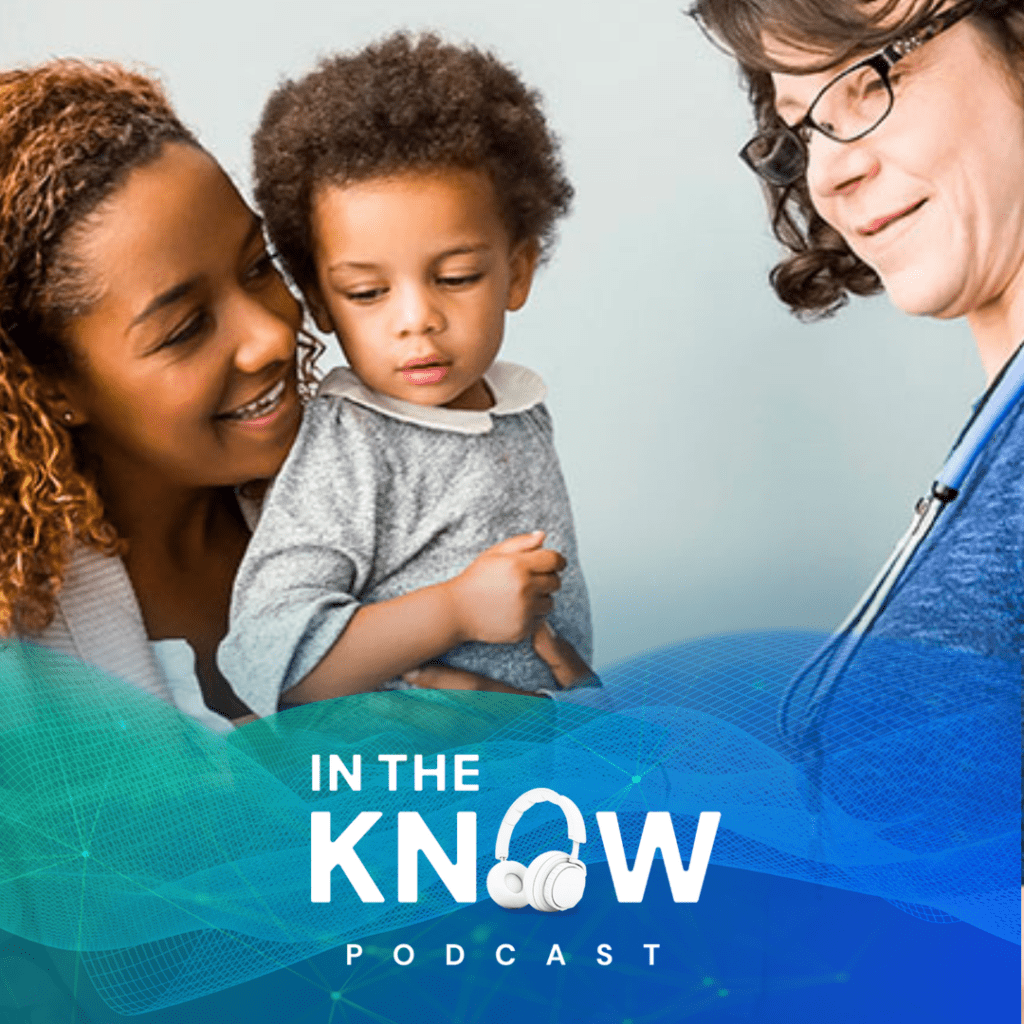
When a child first receives a diagnosis of autism or other behavioral condition or developmental delay, their parents or caregivers will likely have a lot of questions about what to do next. The systems that are in place to help kids get the interventions they need, as well as get on the path to entering the school system, can be complicated and difficult to navigate for many families. In the latest episode of the Cognoa “In the Know” podcast, experienced pediatrician and Past President of the American Academy of Pediatrics, Dr. Colleen Kraft offers clear guidance on advising families on what next steps to take, and how to partner with them along the way. This discussion covers a number of services available and the central role that a primary care physician can take in steering families toward these programs, including local early intervention programs, the variety of therapy types that can be recommended (such as speech and language, functional, occupational) based on the child’s strengths and deficits, and even advising on the child’s Individual Educational Plan (IEP) with the local school district. In describing the role of the pediatrician in the care of a child with autism, Dr. Kraft says, “This is really the pediatric concept of ‘medical home’, where the medical home is that known place of care. It’s the relationship with somebody who is trusted, who can help you out with communicating with other team members. Sometimes it’s a referral or a pre-authorization. Sometimes it’s really listening and helping to synthesize the information that parents and families bring to look at next steps. For many families, your medical home is kind of your center of care. Your pediatrician knows the toolbox, and they help you to navigate all the systems of care with their toolbox.” Our new podcast series, In the Know, regularly features conversations with top experts in behavioral and developmental health to provide information and insights for clinicians and for families of children with developmental delays. “In the Know, Presented by Cognoa” can be found on most major podcast platforms, including Apple Podcasts, Spotify, Podbean, and others. Be sure to subscribe so you can be sure to catch the future episodes when they are available!
“What Happens After Diagnosis?”: Making the Pediatrician an Essential Part of the Treatment Team
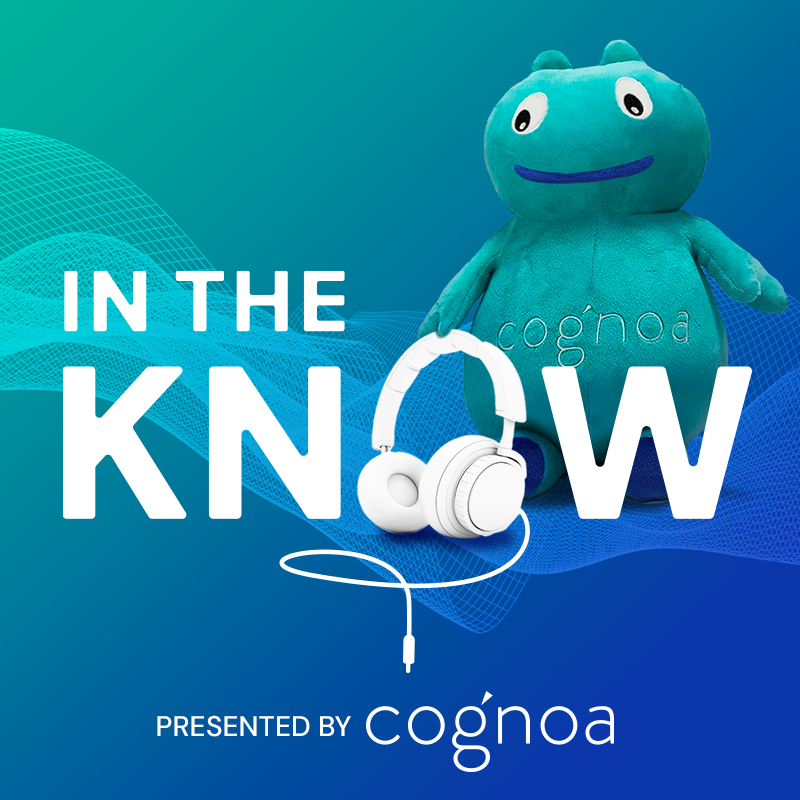
Have you ever wondered, “Now that a child has an autism diagnosis, now what?” In the first episode of our new podcast, experienced pediatrician and past president of the American Academy of Pediatrics Dr. Colleen Kraft talks about what are the next steps that pediatricians and the families they serve should take after a child is diagnosed with autism or other developmental delay. Dr. Kraft focuses particularly on the ongoing role of the pediatrician, who is key to a child’s success, particularly in a time when there are not enough specialists to care for the millions of kids with developmental delay in the U.S. “One of the things that we’ve noticed is that there’s a lot of ‘diagnosis and adios,’ where a child is diagnosed and then the family is left asking, okay, what’s next? And that really is where primary care comes into play,” Dr. Kraft observes. This podcast episode is full of helpful information about how to work with families to make a treatment plan, to manage their developmental challenges, and how to be an essential partner with parent groups, early intervention programs, and schools in helping that child progress and more. Our new podcast series, In the Know, regularly features conversations with top experts in behavioral and developmental health to provide information and insights for clinicians and for families of children with developmental delays. “In the Know, Presented by Cognoa” can be found on most major podcast platforms, including Apple Podcasts, Spotify, Podbean, and others. Be sure to subscribe so you can catch the future episodes when they are available!